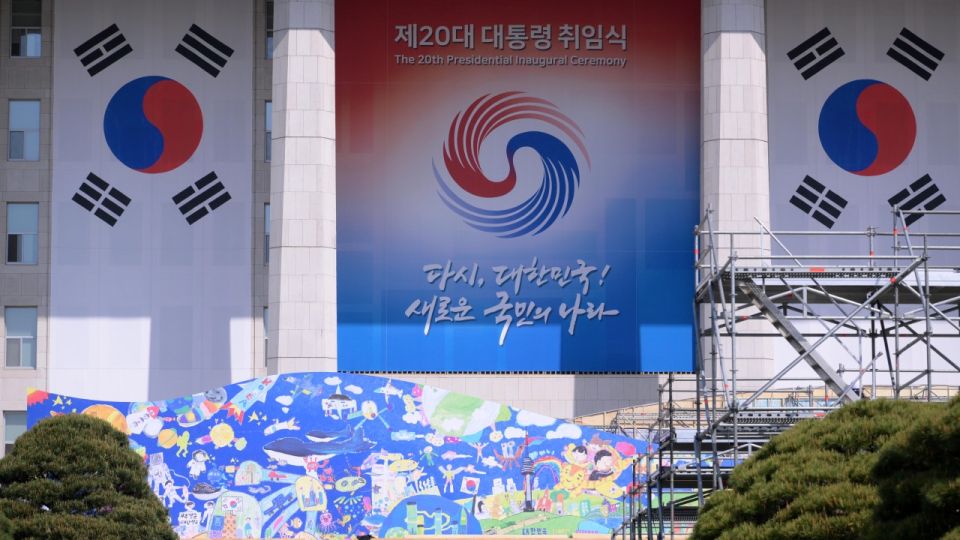May 5, 2022
SEOUL – The United States and China are reviewing which key figures to send to the inauguration ceremony of President-elect Yoon Suk-yeol on May 10, to stress the importance of their relations with Korea. Meanwhile, Japan is reported to have dropped plans for its prime minister’s attendance, as thorny issues remain unsolved.
The US government will reportedly send second gentleman Douglas Emhoff, a lawyer and the spouse of Vice President Kamala Harris. The US will also send Labor Secretary Marty Walsh, to celebrate Yoon’s inauguration and stress the importance of the Korea-US alliance.
The White House’s decision to send Emhoff seems to have been affected by US President Joe Biden’s visit to Korea on May 20, just 10 days after the inauguration. The US has sent key personnel, including secretary of state, during the inauguration of the South Korean presidents in the past.
This time, it is difficult for Secretary of State Antony Blinken and National Security Advisor Jake Sullivan to attend the ceremony because they are likely to accompany Biden on the trip to Korea. First lady Jill Biden is scheduled to visit Romania and Slovakia from May 5 to May 9 in relation to the invasion of Ukraine.
At past inauguration ceremonies, the then-National Security Advisor Tom Donilon attended for former President Park Geun-hye. The then-Secretary of State Condoleezza Rice came for former President Lee Myung-bak and the then-Secretary of State Colin Powell visited for former President Roh Moo-hyun. There were no foreign envoys for President Moon Jae-in, as he took office right after Park Geun-hye was impeached.
In this context, Emhoff’s visit can be seen as the White House’s expression of sincerity to Korea, by sending a symbolic figure who is part of Biden’s “White House family.”
China has generally sent deputy prime minister-level officials as congratulatory envoys, but this time it is reported that Vice President Wang Qishan will attend the event.
Wang is considered to be among Xi Jinping’s closest political allies, as he has been instrumental in carrying out Xi’s anti-corruption campaign since 2013.
With respect to Wang’s visit to Korea, analysts say that the move is aimed at keeping in check the close tie between Korea and the US at a time when the two countries’ summit is scheduled to be held 11 days after the inauguration.
Wang is likely to deliver Xi’s message to the new government while attending the inauguration ceremony.
In Japan, it is highly likely that Japanese Foreign Minister Yoshimasa Hayashi will be dispatched as a representative. Initially, the attendance of Prime Minister Fumio Kishida was reviewed to improve strained Korea-Japan relations, but it was later decided to send Hayashi to the inauguration ceremony instead.
Japanese media outlets reported that there are cautious opinions within the government about Kishida’s visit to Korea, as there is no specific solution to historical issues at the root of the soured relations.
As for business leaders, Samsung Electronics Vice Chairman Lee Jae-yong, SK Group Chairman Chey Tae-won, Hyundai Motor Group Chairman Chung Eui-sun, LG Group Chairman Koo Kwang-mo and Lotte Group Chairman Shin Dong-bin were invited to the inauguration ceremony and dinner, alongside the heads of six economic organizations.
Families of the former presidents are also invited. Former President Park Geun-hye, former President Chun Doo-hwan’s spouse Lee Soon-ja and former President Roh Tae-woo’s daughter Roh Soh-yeong are likely to attend the event, according to the presidential transition committee. The family members of former President Roh Moo-hyun, including his spouse Kwon Yang-sook, will not attend the meeting.
The Democratic Party’s lawmakers, who received the invitation letter on Tuesday, are reluctant to attend the event, as domestic political fissures have deepened since the election.
“The public sighs deeply at the inauguration of Yoon Suk-yeol’s super-luxurious inauguration,” Yun Ho-jung, the ruling party’s floor leader, said in a speech at a meeting on April 27. The party raised criticisms at the ceremony’s expected cost of 3.3 billion won ($2.6 million). The dinner will be held at the high-end Shilla Hotel guesthouse, instead of the Cheong Wa Dae guesthouse.


